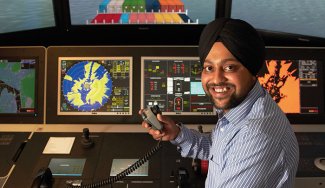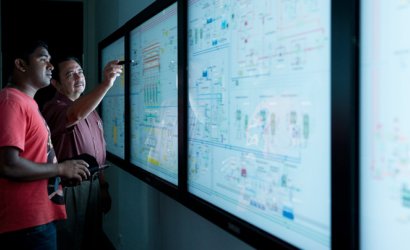

Why choose this course?
For a career in marine engineering, this is the qualification to choose. You will study mechanics, thermodynamics, electro technology and naval architecture.
During your studies you will learn about electrical, electronic and control engineering along with the operation and maintenance of marine engineering plant and equipment.
This qualification is suitable for people working in the maritime industry who seek Australian Maritime Safety Authority (AMSA) certification in the capacity of:
- engineer class 1 - Standard of Training, Certification and Watchkeeping (STCW) chief engineer unlimited; or
- engineer class 2 - STCW second engineer unlimited on ships.
Successful completion of this course requires sea time (seagoing service time being the total of all of your individual working days onboard vessels), plus the AMSA oral examination that enables students to obtain the AMSA certificate.
More information is available at the AMSA website (amsa.gov.au)(opens in a new tab). Students are encouraged to check this website on a regular basis as frequent changes may occur.
This course is a full-time program that is timetabled over 4 to 5 days per week. This means you will have a very heavy study load which will encroach on your personal commitments during weekdays over the course of the program. The timetabled hours per week are essential to ensure all course requirements are met.
Career opportunities
- Marine Engineer (Class 1 or 2)
-
An IELTS score (academic) of 7.0 with no band score less than 7.0 or equivalent.
-
Completion of MAR50120 Diploma of Marine Engineering [Engineer Class 3 Near Coastal] (AC31) OR [Engineer Watchkeeper Specialist] (AC62) is required for entry into this course.
-
Equivalent to Australian Year 12.
-
Students must submit a comprehensive Resume outlining their work experiences, employment history and qualifications in order for the application to be assessed for entry into this course.
-
You must have the following to be considered:
be part of an AMSA approved engineer cadet program of at least 3 years duration and appropriate qualifying sea-time OR have completed the following documented qualifying seagoing service – a Certificate of competency, which demonstrates at least 12 months of qualifying seagoing service on vessels at least 750 kW propulsion power while holding an Engineer Watchkeeper certificate OR its equivalent of which at least 9 months was on vessels using propulsion of the kind to which the certificate relates OR if holding an Engineer Watchkeeper Certificate of Competency or any other Certificate that AMSA considers to be at least equivalent to an Engineer Watchkeeper.You will need a certificate of competency to be qualified to work in the Australian maritime industry and on Australian or international vessels in international waters. You must also be properly trained to work in your role in the maritime industry. (See Qualifications & training (amsa.gov.au) for more information).
Based on any certificates or qualifications that you may already hold, you may be required to undertake additional short course qualifications as specified by AMSA. This is an AMSA requirement for certification for all seafarers. The fees may be up AUD $10,000 depending on your training.
The AMSA certification of competency will require you to:
• have the MAR60120 Advanced Diploma of Marine Engineering Class 1 qualification;
• hold or have held certificates of competency as defined in Marine Order 72, which sets out the requirements for eligibility, training and experience requirements to become an engineer under the Navigation Act 2012. You can find more information at https://www.amsa.gov.au/about/regulations-and-standards/marine-order-72-engineer-officers.
• have qualifying sea service as defined in Marine Order 72;
• have completed STCW short courses as defined in Marine Order 72;
• hold a valid AMSA certificate of medical fitness;
• have a final AMSA assessment pass; and
• meet any other regulatory requirements as defined in Marine Order 72.
There may be further semester intakes available for enrolment. You can view any further intakes when you submit your online application(opens in a new tab).
For information about pathways from TAFE to university, view our Pathways to university page.
How to apply
Apply to study at TAFE in six steps:
- find a course;
- check entry requirements;
- submit an application;
- accept your offer and pay;
- apply for your student visa; and
- receive your visa and come to Australia for your studies.
Build your own course guide
Select the study areas, courses and topics you like. Get your custom guide by email!
Download study area guide(opens in a new tab)
Contact us(opens in a new tab)
TAFE International Western Australia (TIWA) is the Registered Training Organisation (RTO) and Commonwealth Register of Institutions and Courses for Overseas Students (CRICOS) provider, for the delivery of training to international students, enrolled in a TAFE course in Western Australia. This nationally recognised course is delivered by a Western Australian TAFE college on TIWA's behalf. TIWA retains responsibility for the quality of the training and assessment delivered by the TAFE colleges and for the issue of certification documentation to students.

